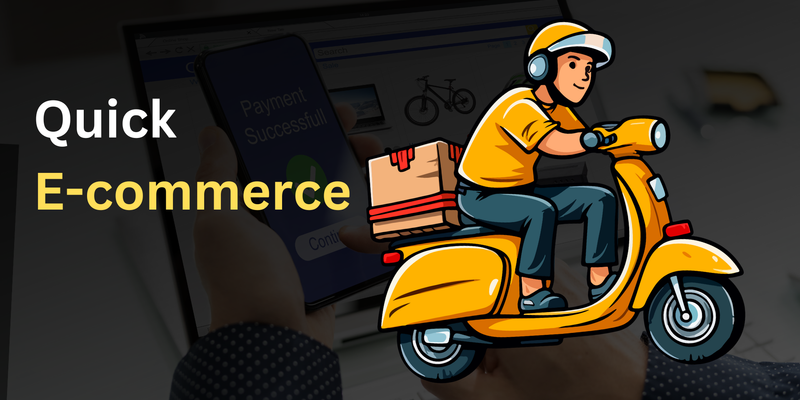The rapid growth of quick commerce—where consumers expect goods to be delivered within hours or even minutes—is revolutionising the retail landscape. As consumers crave faster, more efficient services, businesses scramble to keep up with this heightened demand. Enter enabler tech startups, the unsung heroes quietly driving this transformation from behind the scenes.
These tech-focused companies provide the essential tools, platforms, and infrastructure that allow traditional and emerging retailers to meet skyrocketing consumer expectations. With cutting-edge logistics, AI-driven inventory management, and seamless payment systems, these enabler startups are not just keeping up—they are propelling the quick commerce revolution forward. Early-stage venture firms are taking notice, with many actively exploring investment opportunities, making the enabler startup space one of the most sought-after sectors for investors today.
In this article, we’ll explore how the quick commerce boom has sparked the rise of these enabler tech startups, the key innovations they’re introducing, and the future they’re shaping.
The rise of quick commerce: A shift in consumer behaviour
Quick commerce, or “q-commerce,” emerged from the consumer’s increasing appetite for instant gratification. It goes beyond the standard next-day delivery offered by giants like Amazon, pushing for ultra-fast delivery times—often within 30 minutes or less. The global pandemic further accelerated this shift, with lockdowns forcing millions to rely on online shopping for even the most basic needs. Whether it’s groceries, medication, or electronics, today’s consumers expect speed, convenience, and reliability.
Mumbai has seen a particular uptick in this trend, with hyperlocal startups such as Dunzo and Zepto leading the charge. As the city becomes a hotbed for quick commerce innovation, new-age brands, and even established e-commerce firms, are rushing to optimise delivery times to match this rapidly changing consumer demand. These efforts are being backed by a wave of investment, with several venture firms eyeing the growing opportunities in this burgeoning sector.
What are enabler tech startups?
Enabler tech startups are companies that provide the technology and infrastructure necessary to fuel other businesses, particularly in the quick commerce ecosystem. They specialise in areas such as:
- Logistics optimisation: Tools for route optimisation, last-mile delivery solutions, and real-time tracking.
- Inventory management: AI-driven platforms that predict demand, reduce waste, and keep supply chains efficient.
- Payment gateways: Seamless, secure payment integrations that ensure frictionless transactions.
- Customer experience solutions: CRM platforms, chatbots, and AI-powered customer service for faster resolution and better communication.
Unlike direct-to-consumer (D2C) brands or traditional tech companies, enabler startups work behind the scenes, empowering other businesses to scale efficiently and adapt to the rapid pace of change in consumer expectations.
Key innovations driving the surge
Several technological advancements are driving the quick commerce and enabler startup ecosystem:
AI and Machine Learning
Many enabler startups are leveraging AI to forecast demand, optimise delivery routes, and personalise the shopping experience. For instance, AI-based platforms can predict peak ordering times and adjust inventory levels accordingly, ensuring faster and more efficient fulfilment.
Last-mile delivery solutions
Last-mile delivery, the final step in the delivery process, is notoriously challenging and expensive. Startups like Locus, Deliverr, and Bringg have developed platforms that optimise delivery routes, reduce costs, and improve speed, allowing quick commerce companies to meet tight delivery windows.
Dark stores and micro fulfilment centers
To keep up with rapid delivery demands, q-commerce businesses are increasingly turning to dark stores—retail outlets that are closed to the public but serve as hubs for online orders. Tech startups are helping brands set up and manage these spaces efficiently, ensuring quick delivery without the burden of operating large retail storefronts.
Real-time data and analytics
By providing real-time data insights on customer preferences, buying patterns, and supply chain bottlenecks, enabler tech startups are helping quick commerce companies refine their operations and scale up quickly without compromising on customer experience.
Major players in the enabler startup ecosystem
Several enabler tech startups have gained significant traction by capitalising on the quick commerce trend. Here are a few noteworthy examples:
Locus: An AI-driven platform that provides automated routing and scheduling for deliveries, helping brands reduce last-mile delivery costs.
Deliverr: Specialises in fast shipping fulfilment for e-commerce businesses, allowing brands to offer 1- or 2-day shipping to compete with giants like Amazon.
Bringg: Provides a cloud-based platform that enables businesses to manage complex delivery operations with real-time visibility and control over orders.
Fabric: Focuses on building micro-fulfillment centers, bringing inventory closer to urban areas to meet the demand for ultra-fast deliveries.
These companies are the backbone of the quick commerce industry, making it possible for smaller retailers and D2C brands to compete in a market dominated by larger players.
The future of quick commerce and enabler startups
As quick commerce continues to expand, the demand for efficient and scalable technology solutions will only grow. Enabler startups are poised to be the key drivers of innovation in this space, providing the tools and infrastructure needed to meet the expectations of consumers who want everything now.
The next frontier could involve autonomous vehicles, drone deliveries, and further integration of AI into logistics networks. As these innovations become more mainstream, the role of enabler startups will become even more crucial, shaping the future of how goods are delivered and consumed.




![Read more about the article [Tech50] How Bengaluru-based Neokred is offering ‘bank in a box’](https://blog.digitalsevaa.com/wp-content/uploads/2022/01/neokred-1641275561264-300x150.jpg)





